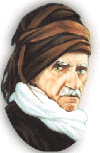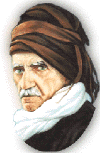Who İs Said Nursi

Said Nursi, also widely known as Bediuzzaman (the Wonder of the Age) was born in 1877 in eastern Turkey. Bediuzzaman displayed an extraordinary intelligence and ability to learn from an early
age, completing the normal course of religious school education at the early age of fourteen, when he obtained his diploma. He became famous for both his prodigious memory and his unbeaten record in debating with other religious scholars. Another characteristic Bediuzzaman displayed from an early age was an instinctive dissatisfaction with the existing education system, which when older he formulated into comprehensive proposals for its reform.
The heart of these proposals was the bringing together and joint teaching of the traditional religious sciences and the modern sciences, with the founding of a university in the Eastern Provinces of the Ottoman Empire, the Medresetü'z-Zehra, where this and his other proposals would be put into practice. In 1907 his endeavors in this field took him to Istanbul and an audience with Sultan Abdulhamid II. Although subsequently he twice received funds for the construction of his university, and its foundations were laid in 1913, it was never completed due to war.
Contrary to the practice of religious scholars at that time, Bediuzzaman himself studied and mastered almost all the physical and mathematical sciences, and later studied philosophy. In the course of time, modern sciences had been dropped from the religious schools curriculum, which had contributed directly to the Ottoman decline relative to the advance of the West. Bediuzzaman's endeavor was to prove and demonstrate that Islam is compatible with modern sciences and progress, the Holy Book was the source of true progress and civilization.
The years up to the end of the First World War were the final decades of the Ottoman Empire and were, in the words of Bediuzzaman, the period of the 'OldSaid'. In additions to his endeavors in the field of learning, he has had active involvement in social life and the public domain. In the War, he commanded the militia forces on the Caucasian Front against the invading Russians, for which he as later awarded a War Medal. To maintain the morale of his men he himself disdainedto enter the trenches against heavy shelling, and it was while withstanding the overwhelming assaults of the enemy that he wrote his celebrated the Holy Book's commentary, Signs of Miraculousness, dictating to a scribe while on horseback'stating that the Holy Book encompasses the sciences which make known modern sciences, the commentary is an original and important work which in Bediuzzaman's words, forms a sort model for commentaries he hoped would be written in the future, which would bring together the religious and modern sciences in the way he proposed. Bediuzzaman was taken prisoner in March 1916 and held in Russia for two years before escaping in early 1918, and returning to Istanbul via Warsaw, Berlin, and Vienna.
The defeat of the Ottomans saw the end of the Empire and its dismemberment, and the occupation of Istanbul and parts of Turkey by foreign forces. These bitter years saw also the transformation of the Old Said into the New Said, the second main period of Bediuzzaman's life. Bediuzzaman underwent a profound mental and spiritual change in the process of which he turned his back on the world. Realizing the inadequacy of the 'human' science and philosophy he had studied as a means of reaching the truth, he took the revealed Qur'an as his 'sole guide.' In recognition of his services to the Independence Struggle, Mustafa Kemal (the founder of modern Turkey) invited Bediuzzaman to Ankara. Remaining some eight months in Ankara, he was offered various posts and benefits by Mustafa Kemal. He declined them and left Ankara for Van, where he withdrew into a life of worship and contemplation; he was seeking the best way to proceed.
In early 1925 there was a rebellion in the east in which Bediuzzaman played no part, but as a consequence of which was sent into in western Anatolia along with many hundreds of others. When he started to speak about oppression of thought and beliefs unjustly began twenty-five years of exile, imprisonment, and unlawful oppression for Bediuzzaman. He was sent to Barla, a tiny village in the mountains of Isparta Province. However, the attempt to entirely and silence him had the reverse effect, for Bediuzzaman was both prepared and uniquely qualified to face the new challenge. He has spend these years writing of the Risale-i Nur collection, which silently spread and took root, combating in the most constructive way the attempt to uproot freedom of religion and expression in today's modern Turkey.He died when he was in exile in Urfa, Turkey in 1960.
